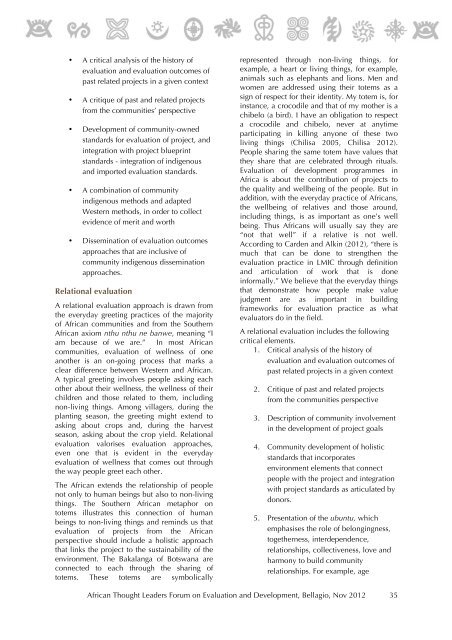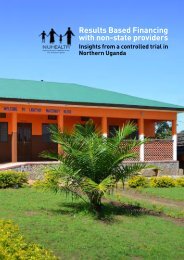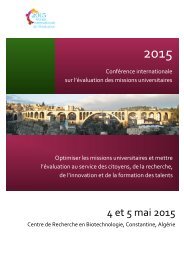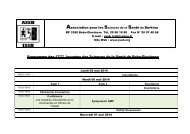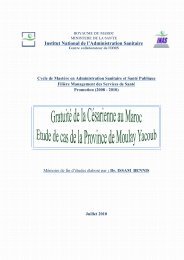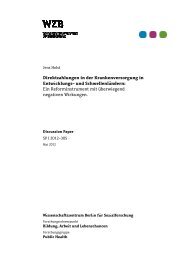Bellagio-Report-Vs-Apr-14
Bellagio-Report-Vs-Apr-14
Bellagio-Report-Vs-Apr-14
You also want an ePaper? Increase the reach of your titles
YUMPU automatically turns print PDFs into web optimized ePapers that Google loves.
• A critical analysis of the history ofevaluation and evaluation outcomes ofpast related projects in a given context• A critique of past and related projectsfrom the communities’ perspective• Development of community-ownedstandards for evaluation of project, andintegration with project blueprintstandards - integration of indigenousand imported evaluation standards.• A combination of communityindigenous methods and adaptedWestern methods, in order to collectevidence of merit and worth• Dissemination of evaluation outcomesapproaches that are inclusive ofcommunity indigenous disseminationapproaches.Relational evaluationA relational evaluation approach is drawn fromthe everyday greeting practices of the majorityof African communities and from the SouthernAfrican axiom nthu nthu ne banwe, meaning “Iam because of we are.” In most Africancommunities, evaluation of wellness of oneanother is an on-going process that marks aclear difference between Western and African.A typical greeting involves people asking eachother about their wellness, the wellness of theirchildren and those related to them, includingnon-living things. Among villagers, during theplanting season, the greeting might extend toasking about crops and, during the harvestseason, asking about the crop yield. Relationalevaluation valorises evaluation approaches,even one that is evident in the everydayevaluation of wellness that comes out throughthe way people greet each other.The African extends the relationship of peoplenot only to human beings but also to non-livingthings. The Southern African metaphor ontotems illustrates this connection of humanbeings to non-living things and reminds us thatevaluation of projects from the Africanperspective should include a holistic approachthat links the project to the sustainability of theenvironment. The Bakalanga of Botswana areconnected to each through the sharing oftotems. These totems are symbolicallyrepresented through non-living things, forexample, a heart or living things, for example,animals such as elephants and lions. Men andwomen are addressed using their totems as asign of respect for their identity. My totem is, forinstance, a crocodile and that of my mother is achibelo (a bird). I have an obligation to respecta crocodile and chibelo, never at anytimeparticipating in killing anyone of these twoliving things (Chilisa 2005, Chilisa 2012).People sharing the same totem have values thatthey share that are celebrated through rituals.Evaluation of development programmes inAfrica is about the contribution of projects tothe quality and wellbeing of the people. But inaddition, with the everyday practice of Africans,the wellbeing of relatives and those around,including things, is as important as one’s wellbeing. Thus Africans will usually say they are“not that well” if a relative is not well.According to Carden and Alkin (2012), “there ismuch that can be done to strengthen theevaluation practice in LMIC through definitionand articulation of work that is doneinformally.” We believe that the everyday thingsthat demonstrate how people make valuejudgment are as important in buildingframeworks for evaluation practice as whatevaluators do in the field.A relational evaluation includes the followingcritical elements.1. Critical analysis of the history ofevaluation and evaluation outcomes ofpast related projects in a given context2. Critique of past and related projectsfrom the communities perspective3. Description of community involvementin the development of project goals4. Community development of holisticstandards that incorporatesenvironment elements that connectpeople with the project and integrationwith project standards as articulated bydonors.5. Presentation of the ubuntu, whichemphasises the role of belongingness,togetherness, interdependence,relationships, collectiveness, love andharmony to build communityrelationships. For example, ageAfrican Thought Leaders Forum on Evaluation and Development, <strong>Bellagio</strong>, Nov 2012 35


